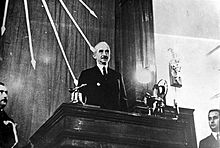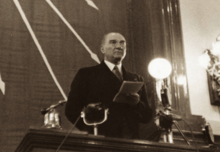Republican People's Party (Turkey)
![]()
Republican People's Party is a redirect to this article. For other meanings, see Republican People's Party (disambiguation).
The Cumhuriyet Halk Partisi (short name: CHP; Turkish for "Republican People's Party") is a Kemalist and, since the 1960s, a social democratic party in Turkey. It was founded in 1923 by the founder of the state and first Turkish president, Mustafa Kemal Atatürk, and is thus the oldest active party in the country.
As the largest opposition party, the CHP has formed the main parliamentary opposition faction since the 2002 elections. The party holds 138 of the 600 seats (as of June 12, 2020) in the National Assembly following the June 2018 general election. Its leader has been Kemal Kılıçdaroğlu since 2010. The party is an associate member of the Party of European Socialists and a full member of the Socialist International.
The six arrows on the party logo represent the six principles of Kemalism: republicanism (as the most appropriate form of government), secularism (i.e., the separation of religion and state), populism (as an expression of a policy directed toward the interests of the people, not a class), revolutionism (in the sense of a steady continuation of reforms), nationalism (as a turn against a multi-ethnic and religious Ottoman-style concept of the state), and statism (with partial state control of the economy).
The CHP has been in an electoral alliance with the İYİ Parti since 2018, the Alliance of the Nation (Turkish Millet İttifakı).
History
The predecessor of the CHP was initially founded in 1919 at the Sivas Congress of the Turkish National Movement (led by Mustafa Kemal Pasha) as a resistance organization against the Greek occupation of Anatolia. In terms of content and personnel, it was the successor to the "Society for the Defence of the Rights of Rumelia and Anatolia", active until 1923 in the then dissolved Ottoman Empire, whose leaders had been advised by German Social Democrats such as Friedrich Schrader, among others. In 1923 it declared itself a political party, which was the only party in the country until 1945.
Initially the party was called خلق فرقه سی / Ḫalḳ Fırḳası / 'People's Party' and in 1924 it was renamed جمهوريت خلق فرقه سی / Cumhūrīyet Ḫalḳ Fırḳası / 'Republican People's Party'. In 1927, it adopted the four principles of republicanism, 'populism', nationalism and secularism. In 1935, the principles of etatism and 'revolutionism' were added and the party changed its name to Cumhuriyet Halk Partisi. Its first chairman was Mustafa Kemal Pasha. He was succeeded by İsmet İnönü as chairman and second president of the Republic of Turkey after his death in 1938. The latter had the republic's first multi-party elections held in 1946, where the CHP achieved nearly 85%. In the 1940s, the CHP established, among other things, the Village Institutes, with the aim of ensuring a nationwide supply of schools.
In the 1950 elections, however, it was the Demokrat Parti that provided the majority in parliament, thus bringing the CHP into the opposition role for the first time. For 20 years after the military coup of 1960, it was one of the two major Turkish parties, along with the Justice Party (AP). From 1966, the CHP began to introduce newer ideas under Bulent Ecevit. Although Ecevit did not exclude Kemalism, he tried to transform the party into a social democratic party, avoiding the word "social democratic". He announced that the party was now "left of center" in the political spectrum. Because of this declaration, two groups of parliamentary deputies resigned from the CHP. The first established the Confidence Party in 1967, while the Republican Party (Cumhuriyetçi Parti) was founded by the second group in 1972.
After the military coup of 1980, the CHP, like others, was banned and closed. Many of its former members joined the new Populist Party (Halkçı Parti, HP) or Erdal İnönüs' Social Democracy Party (SODEP). Both parties united in 1985 to form the Social Democratic Populist Party (SHP). The word populism has its own meaning here; it is understood as an expression of politics directed towards the interests of the people, not of a class.
In addition, the Democratic Left Party (DSP) of former CHP Prime Minister Bulent Ecevit, which also sees itself as social democratic, was founded in 1985 and achieved better results in 1995 and 1999 than the newly formed CHP.
It was not until 1992 that the party was re-established under the same name, and the SHP joined it in 1995. From 1996 to 1999, on the other hand, the Alevi Peace Party split from the CHP. From 1999 to 2002, the CHP was no longer represented in the National Assembly due to competition from the DSP, which was the strongest parliamentary group during this period (Turkey has a ten percent threshold).
Under Deniz Baykal's leadership, the party increasingly turned away from the left and emphasized above all an uncompromising anti-Western Turkish nationalism. Commitment to trade union rights, reconciliation with minorities, freedom of opinion and democratic co-determination receded as the party's goals and content. Baykal was against the abolition of § 301 of the Turkish Penal Code (disparagement of the Turkish nation, the state of the Republic of Turkey, the institutions of the state and its organs) and saw the AKP's policy of rapprochement with the EU as the "sell-out" of the country. As for the Kurdish conflict, the party now backed the military and at the time supported a possible invasion of northern Iraq. Baykal himself spoke out in favor of an invasion of Iraq. Through this development of the party under Deniz Baykal's leadership, the nationalist, structurally conservative variant of Kemalism emerged more strongly.
After Baykal's resignation in May 2010 due to the publication of a compromising video on the Internet, Kemal Kılıçdaroğlu took over the leadership of the party. At the 33rd party congress, held on May 22, he received 100% of the valid votes. Since then, the party tended to move away from nationalist to more social democratic policies again. This was also assessed by experts at home and abroad. In doing so, it aims above all to appeal to voters who have not benefited from the neoliberal, growth-oriented economic policies of the Erdoğan government. This stabilized the party's election results, but it remained limited to its core constituency in the urban-secular milieu in the west of the country.
In the 2014 local elections, in a political situation marked by open conflict between the AKP and the Gülen movement, the CHP also ran politicians from the religious or right-wing nationalist milieu in important municipalities. These include in Ankara the former MHP politician Mansur Yavaş, in Hatay the incumbent, but not re-elected, AKP mayor of Antakya, Lütfü Savaş, and in Fatih Sabri Erbakan, the nephew of former Prime Minister Necmettin Erbakan. This decision was not without controversy within the CHP. In Istanbul, Mustafa Sarıgül, the long-time mayor of Şişli, who is considered liberal and was expelled from the CHP in 2005 for trying to overthrow the party's leader at the time, Baykal, was running.
In the parliamentary elections in June 2015, the CHP won a quarter of the votes, but the opposition at the time could not agree on any coalitions, so new elections had to be called. Although the CHP made slight gains in these elections, the AKP won the parliamentary majority.
In April 2016, the chairman of the Turkish parliament, İsmail Kahraman of the Islamic conservative AKP party, called for a "religious[n] constitution". This met with criticism from the CHP:
"[...] Kahraman has shamelessly and openly attacked secularism, religious freedom and republic. He did not utter these words without reason. The parliament speaker should resign immediately. We will defend our red line, secularism, to the last CHP member [...]"
- CHP spokeswoman Selin Sayek Böke of April 27, 2016.
In June and July 2017, the "Justice March" of Chairman Kemal Kılıçdaroğlu took place. It started the protest against the imprisonment of MP Enis Berberoğlu regarding the Cumhuriyet trial. According to the organizers, the final rally took place in front of two million people in Maltepe.
On July 18, 2016, Cemil Candas, CHP politician and deputy mayor of Şişli, was seriously wounded by a bullet to the head in an assassination attempt and succumbed to his injuries a few hours later. At the time of the assassination it was unclear whether it was connected to the coup attempt on July 15 and 16, 2016.
For the presidential election on 24 June 2018, Muharrem İnce was entered into the race, who was able to achieve just under 30%, but was defeated by the incumbent Recep Tayyip Erdoğan. The CHP, on the other hand, suffered losses of almost three percent, sparking a debate within the party about the chairman.
In the local elections on March 31, 2019, the CHP won against both the AKP and the MHP in numerous major cities. Among others, in the country's largest city Istanbul, the capital Ankara and the tourist metropolis Antalya, which means that the party is the mayor in eleven of the 30 metropolitan municipalities. Especially the election victory in Istanbul with its representative significance and the previous annulment caused an international sensation.

İsmet İnönü, Prime Minister of the Republic of Turkey until 1937 and President until 1950, at a CHP congress in the 1930s.
Party Program
The CHP's party programme is entitled Changes for a Contemporary Turkey (German for Çağdaş Türkiye için değişim). In it, the party refers to its history and sees itself as the guardian of Mustafa Kemal Atatürk's principles and his "revolutions" after the proclamation of the Republic of Turkey in 1923. The six arrows on the party logo are the ideological framework coming from history: These represent republicanism, secularism, "reformism" (modernization of the state), statism, "populism" (in the sense of popular sovereignty) and nationalism.
In its programme, the party sees itself committed to the republic, secularism and democracy. These principles are to be protected and developed with determination. The party considers a modern, self-determined and civilized nation with free citizens as the goal of its ideals. In the programme it is mentioned that one is against imperialism, system errors, inequalities, revisionism, exploitation and sinecures. The Turkish accession to the European Union sought by the CHP is regarded as a necessary completion of Atatürk's reforms for the modernization of Turkey.

Party founder Mustafa Kemal Atatürk (1935)
Questions and Answers
Q: What is the Republican People's Party?
A: The Republican People's Party is the oldest political party in Turkey with social democracy and Kemalism beliefs.
Q: What is the position of the Republican People's Party in the Turkish Parliament?
A: The Republican People's Party is the second-largest party in the Turkish Parliament, with 132 out of 550 seats, and they form the Main Opposition of Turkey.
Q: Who founded the Republican People's Party?
A: Mustafa Kemal Atatürk founded the Republican People's Party.
Q: Who is the current leader of the Republican People's Party?
A: Kemal Kılıçdaroğlu is the current leader of the Republican People's Party.
Q: When was the Republican People's Party established?
A: The Republican People's Party was officially declared as a political party on September 9, 1923.
Q: Why was the Republican People's Party established?
A: The Republican People's Party was established as a resistance organization against the invasion of Turkey.
Q: What are the ideologies of the Republican People's Party?
A: The ideologies of the Republican People's Party are social democracy and Kemalism.
Search within the encyclopedia